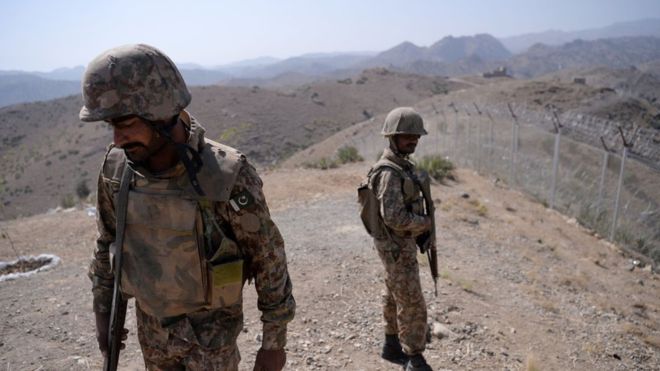Uncovering Pakistan's secret human rights abuses

Tens of thousands of people have been killed in Pakistan's long battle with militants as part of the post-9/11 "war on terror". Evidence of murder and torture by soldiers and insurgents is emerging only now. The BBC has gained rare access to some of the victims.
It was early in 2014 when TV news networks trumpeted a major victory in the war against the Pakistani Taliban - the killing of one of the group's most senior commanders in a night-time air raid.
Adnan Rasheed and up to five members of his family were reported to have died in the strikes in the North Waziristan tribal area, near the Afghan border.
Rasheed, a former Pakistan Air Force technician, was well-known. He had written an extraordinary letter to Malala Yousafzai, the schoolgirl and activist shot in the head by Taliban gunmen in 2012, attempting to justify why it had happened. He'd also been in prison for trying to assassinate former President Pervez Musharraf - until he broke out.
Now it appeared that his luck had run out.
Quoting security officials, news channels reported on 22 January 2014 that Adnan Rasheed's hideout had been targeted two nights earlier in the Hamzoni area.
Waziristan and other parts of the vast mountainous tribal region have been controlled and locked-down by the Pakistani military since the US invasion of Afghanistan after 9/11, which saw Taliban fighters, al-Qaeda jihadists and other militants flee over the porous border.
Outsiders, including journalists, cannot get in - so verifying claims from the security forces is extremely difficult. Those who have reported stories from Waziristan that don't reflect well on the military have found themselves punished.
It turned out a year later that the jets had hit the wrong target - Rasheed confirmed this when he emerged in a video to prove he was alive.
Instead of taking out a top militant, Pakistan's military had actually killed the family of a local man who had his home blown to pieces.
The authorities have never acknowledged they made a mistake. The BBC travelled to Dera Ismail Khan, a town on the banks of the river Indus that is the gateway to the remote and forbidding tribal areas, to meet the man whose house was hit.
"It must have been 11pm or thereabouts," recalls Nazirullah, who was 20 at the time. He and his wife had recently married and had the rare privilege of a room to themselves. The rest of their large family slept in the only other room in their house in Khatei Kalay village.
"It was as if the house had exploded. My wife and I were shaken out of our sleep. There was a strong smell of gunpowder in the air. Both of us rushed to the door and stepped out, only to discover that the entire roof of our room had already collapsed, except a corner where our bed was."
The roof of the second room had also collapsed, and a fire was raging across the compound. Nazirullah heard cries from the rubble and, with his wife, frantically tried to help those they could see in the glow of the fire.
Neighbours helped them dig out the injured and the dead.
Four of Nazirullah's family died, including a three-year-old girl. His niece Sumayya, whose mother was among those killed, was then just a year old, and survived with a fractured hip. Another four members of the family were rescued from the rubble. All suffered fractures and other injuries.
Nazirullah's family has since moved back to Dera Ismail Khan, where life is more peaceful.
Like many others in this part of Pakistan, they have had to move several times to escape an insurgency that has been raging in the tribal areas for nearly two decades.
According to authorities and independent research groups, militant violence since 2002 has forced more than five million people in Pakistan's north-west to leave their homes to seek refuge either in government-run refugee camps or rented houses in peaceful areas.
There are no official figures of the total death toll of this war but estimates from academics, local authorities and activists put the number of civilians, militants and security forces killed at well over 50,000.
